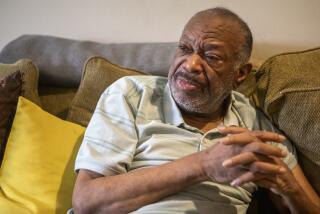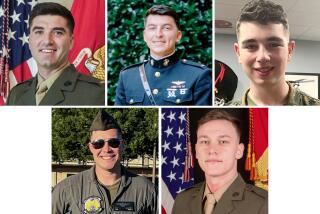Robert H. Barrow dies at 86; former commandant of the Marine Corps
Robert H. Barrow, a former commandant of the Marine Corps who was decorated for heroism and recognized for reforms, died Oct. 30 at his home in St. Francisville, La. He was 86 and had heart and circulatory problems.
Barrow, a retired four-star general, served in World War II and the Korean and Vietnam wars and received the Silver Star, the Distinguished Service Cross and the Navy Cross -- among the highest awards for valor.
Later, as commanding general of the Marine Corps Recruit Depot at Parris Island, S.C., and as the Marines’ deputy chief of staff for manpower at Corps headquarters, Barrow became known for efforts to raise recruiting standards and reduce training abuses.
“Success in battle is not a function of how many show up but who they are,” he once said. He championed bringing in recruits who had high school diplomas and created screening programs for drill instructors, according to a Marine Corps statement.
“My father believed that people and the quality of people transcends everything else that you do in an organization,” a son, retired Marine Lt. Col. Robert H. Barrow Jr., said in an interview. In addition, he said, his father “had zero tolerance on drug abuse.”
Named to the Marines’ top job by President Carter, Barrow served through the early part of the Reagan administration and retired in 1983. He was the first Marine commandant to serve a full four-year term on the Joint Chiefs of Staff.
Robert Hilliard Barrow was born in Baton Rouge, grew up on a family plantation in Louisiana’s West Feliciana Parish and studied at Louisiana State University before enlisting in the Marines during World War II. He later graduated from the University of Maryland.
After boot camp and a stint as a drill instructor, he underwent officer training and was sent to lead Americans working with Chinese guerrilla forces in Japanese-occupied China.
In the Korean War, Barrow led his men in the Inchon landing and in fighting near Seoul. He was lauded particularly for his role in 1950 in the Chosin Reservoir campaign. During fierce fighting in subzero weather, his company took a hill needed to cover the extrication of a division.
A Marine Corps historian described him as the “finest regimental commander” of the Korean War.
After taking command of the 9th Marine Regiment, 3rd Marine Division, in Vietnam in 1968, he was credited with leading it to a series of successes.
Some of his greatest challenges came after his years in combat.
While he was manpower chief in 1976, reports surfaced of brutal incidents during training, and he was called on to institute reforms.
The rigorous physical regimen would stay, he said. But the “excess stress,” which was of questionable military value, would go. Some scoffed, but the revamped training was said to have proved effective.
He also introduced new operational practices, such as positioning Marines’ equipment aboard ships in potential combat zones.
His wife of 53 years, Patty, died in 2005.
In addition to his son Robert Jr., of Tampa, survivors include four other children, Charles C. Pulliam of Greenville, S.C.; Cathleen P. Harmon of Killeen, Texas; Barbara B. Kanegaye of Houston and Mary B. Hannigan of Oakton, Va.; 11 grandchildren; and five great-grandchildren.
Weil is a reporter for the Washington Post, where this story first appeared.
More to Read
Start your day right
Sign up for Essential California for the L.A. Times biggest news, features and recommendations in your inbox six days a week.
You may occasionally receive promotional content from the Los Angeles Times.






